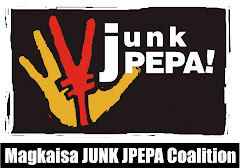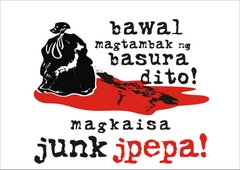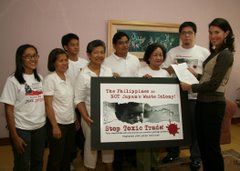
21 February 2008, Quezon City. Concerned citizens for public health and environmental justice called on the country’s 23 Senators to cross party lines and uphold the much larger national interest by rejecting the Japan-Philippines Economic Partnership Agreement (JPEPA).
The prospects of crafting side agreements and safety nets to cure the infirmities of the treaty failed to assuage the concerns of the public interest groups attending the General Assembly of the EcoWaste Coalition Wednesday at the University of the Philippines who again asked the Senators not to ratify the controversial treaty.
To stress their point, the environmentalists mounted a tableau showing President Gloria Macapagal-Arroyo and Environment Secretary Joselito Atienza on top a crate of “toxic cargoes” marked “Express Delivery: Toxic JPEPA,” while EcoWaste Coalition volunteers, their faces painted with colors of the Philippine flag, hold a placard that says “Bawal Magtapon Dito.”
“Most especially, we earnestly appeal to our senators whose legislative and public service agenda proclaim concern for the environment and public health to demonstrate their sincerity by firmly rejecting this toxic treaty,” said Marie Marciano of the Mother Earth Foundation, member of the EcoWaste Coalition’s Steering Committee.
Senators Manny Villar, Pia Cayetano, Chiz Escudero, Gringo Honasan, Ping Lacson, Loren Legarda, Jamby Madrigal, Kiko Pangilinan, Nene Pimentel and Migz Zubiri are some of the Senate members known for speaking out and for filing bills and resolutions on a broad range of environmental and health issues.
“We implore our senators to carefully scrutinize the treaty and have the courage to cross party lines when they cast their votes on JPEPA. This critical time will separate the chafe from the grain among our senators before the watchful eyes of the Filipino people,” said Marciano, adding that “the historic moment calls for principled statesmen who will uphold and protect the broad national interest against the narrow self-serving interests of a few business and political groupings.”
Last 15 February, Sen. Madrigal said “I shall not acquiesce to a treaty that undermines the sovereignty of the republic, sponsors the plunder of foreign and local exploiters, and the abuse and destruction of the environment.”
The EcoWaste Coalition and other environmental groups also urged the Senate to act on the proposal made by Sen. Pia Cayetano regarding the need for “a more definite and legally binding act” to ensure that the Philippines does not become a toxic dumpsite for other people’s refuse.
Sen. Pia Cayetano had earlier said that "ratifying the Basel Ban Amendment would provide greater protection to the Philippines from becoming a dumping ground for toxic wastes, not only from Japan, but also from other industrial countries."
According to the EcoWaste Coalition, the exchange of notes, the side agreements and the safety nets bandied about by the JPEPA proponents are a devious sleight-of-hand designed to draw away the senators’ attention from the glaring faults of a badly-negotiated treaty that lays our country wide open to toxic waste dumping, economic exploitation, and loss of
sovereignty.
While the validity, legality and implementability of these ‘band-aid’ instruments are highly questionable, the ‘sell-out’ provisions and constitutional infirmities of the treaty, once ratified by the senate, become legally and unquestionably binding, observed the group.

A report on JPEPA and toxic waste issues by the Basel Action Network, Global Alliance for Incinerator Alternatives and the EcoWaste Coalition questioned the sanity of opening the country’s ports to a long list of toxic, hazardous and radioactive wastes and materials at zero tariff given the country’s lack of capacity to monitor and safely handle, store and treat these extremely harmful substances.
“It is painfully obvious that we are on the losing end of this new treaty with the Japanese government. We do not have the resources to cope with such a curse disguised as a windfall. The financial, health, and environmental costs are too high to pay for only a few years’ gain for some,” they said.






No comments:
Post a Comment